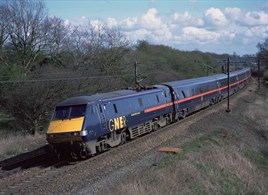Without a clear vision of what it had asked the two companies to bid for, the SRA asked Virgin and GNER to go away and submit fresh bids by April 17 2001. Then, in another change of mind, the SRA announced in July 2001 that it had decided to scrap the contest completely, and eventually offered GNER a franchise extension up to April 2005.
“It’s happened time and time again, and not just with Inter City East Coast. Any time anybody’s come along and suggested something adventurous, they’ve been told ‘no you can’t do it, because it’s not in our spec’!” says Preston.
“We could have had half of effectively HS2 for nothing if people had been a bit braver in what they were willing to try. Fifteen years down the line, what have we got? Where are the new trains? Where is the new line?”
When the franchise eventually was re-advertised in October 2004, the big guns of the transport industry lined up to try to prise it away from GNER’s grasp. Four consortia were shortlisted in the final round: FirstGroup; DSB (the Danish state railway operator); Inter City-railways (a joint bid between Stagecoach, Virgin and German state operator Deutsche Bahn); and GNER itself.
In the end, GNER was awarded the franchise, and signed the new agreement on March 18 2005. The terms raised some eyebrows across the industry, as the company had agreed to pay the Government £1.3bn over the ten years of franchise - a major sea change as GNER had been paid a subsidy throughout the previous franchise.
To meet these payments, GNER assumed passenger numbers would increase by around 30% over the life of the franchise, reaching around 20 million by 2015. But without a major order for new rolling stock, this could only be achieved by increasing load factors on trains that were on average 50% full at the time, to around 65% full. The only news on expanding the fleet was the addition of three extra HST sets, which (as well as refurbishing the existing High Speed Trains) was to cost £75 million.
The London-Leeds route was GNER’s big hope. Here, passenger numbers had increased by 30% in the previous two years, with an increase in weekday services from 37 a day in 1996 to 53 in 2005 - largely thanks to the switching of the GNERstars to the Leeds route in 2002.
The contract included a break clause after seven years, with the final three dependent on GNER meeting performance targets. The company had committed to investing £125m, including £75m on refurbishing its diesel HSTs and expanding the fleet from ten to 13 sets. Some £25m would go on station modernisation.
At the time, Garnett said the franchise would have to be run more efficiently. Unions and passenger groups feared this would mean job cuts, ticket price rises and a reduction of the quality service for which GNER had become known.
On May 1 2005, GNER started its new franchise - but it wasn’t long before the pressures started to show.
“I remember at the time when we were dealing with customer complaints, at times you got the impression that GNER thought it was better than it actually was,” recalls Preston.
“At times you could have a wonderful journey on the train with First Class dining, but the other side of that coin was people on the wrong train with the wrong ticket and being pursued to the ends of the Earth for the last £50.”
Again, GNER faced massive external pressures. The London bombings in July 2005 caused fewer people to travel to the capital, while a rise in power prices and a reduction in the compensation payments from Network Rail (ironically because NR was giving GNER a better service) all began to bite.
It also faced a growing challenge from open access operators on the ECML route. Hull Trains, which began in 2000, was expanding the number of services it operated. And in July 2006, the High Court rejected a bid by GNER to challenge the Office of Rail Regulation’s decision to allow a new operator (Grand Central) to operate on the ECML. GNER was particularly incensed at Grand Central calling at York - one of GNER’s most lucrative markets.
Then came the problems with GNER’s parent company Sea Containers, which filed for Chapter 11 bankruptcy protection in the United States in October 2006, after deciding it couldn’t pay its debts. At first it was thought this wouldn’t affect GNER, but as Professor Felix Schmid of the University of Birmingham’s Centre for Railway Research and Education explains, this didn’t turn out to be the case.
“Sea Containers could not provide the guarantees necessary for the Government, and therefore the risk in continuing the contract was too great for both Sea Containers and GNER.”
This all made the announcement on December 15 2006 pretty much expected - the Department for Transport (DfT) had asked GNER to surrender the franchise when the latter announced it couldn’t afford the premium payments.
In order to keep services running until a new franchise round could be organised, GNER was offered a management contract for 18 months. So by December 2006, both the Inter City East Coast and West Coast franchises were being run on management contracts (West Coast after the forecasts made by Virgin to pay millions to the Government became impossible following the delays to the West Coast Main Line upgrade).
In 2007, the franchising round started all over again - with Arriva, FirstGroup, National Express and Virgin shortlisted. This time National Express claimed the prize, with the transport firm taking control on December 8 2007.















Login to comment
Comments
No comments have been made yet.